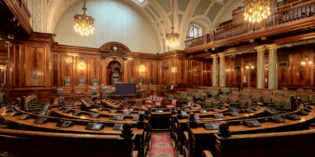Building sub-national government

The territorial politics of coronavirus: is this the hour of central government?
In times of crisis, central governments have often increased their power. Comparing the territorial arrangements of countries facing the first wave of the Covid-19 pandemic, Davide Vampa argues that centralising power would be misguided, and instead we should look to examples of successful coordination within multi-level forms of governance.

Three questions ahead of Northern Ireland’s local elections 2019
Northern Ireland votes in local council elections on Thursday, 2 May. These elections take place while the Northern Ireland Assembly remains dormant, the Brexit process raises seemingly unresolvable questions about the Irish border, and in the aftermath of the murder of journalist Lyra McKee. Jamie Pow previews the elections and outlines some key questions they highlight for Northern Irish politics.

Brexit and devolution in England: what’s at stake
The debate on Brexit has spurred discussion about how the UK’s exit from the EU could affect the devolved nations (Scotland, Wales and Northern Ireland). But, writes Arianna Giovannini, the impact on England is also important to address, as the lack of a coherent devolution policy means that Brexit could have profound institutional, economic and political effects on the largest nation of the UK.

‘The ability of the UK Parliament to override a measure made in any part of the United Kingdom is one of the mischiefs in the UK’s constitution that needs fixing.’ Why it is time to reform the Sewel Convention
The Sewel Convention, by which the UK’s government normally seeks the consent of the devolved legislatures on matters that come within their competence, is enshrined in legislation. However, writes Matthew Hexter, it remains too weak and a constitutional convention is needed to fundamentally alter the balance of powers between London and the devolved nations.

When do central governments decentralise? When it benefits the party in power
Though many European countries have increasingly decentralised power to regional governments, the trend is not necessarily uniform between regions within one country. In a comparative study of this heterogeneous decentralisation, Sofia Collignon finds that the desire of a central party to retain power in its regional strongholds is a significant factor in explaining regional variation.

Schrodinger’s devolution and the potential for ongoing political instability after Brexit
Territorial governance in the UK has taken the form of ‘Schrodinger’s devolution’, where the devolved nations both have and have not experienced fundamental constitutional change. But Brexit highlights the need for exact decisions where ambiguity has so far existed, explain Mark Sandford and Cathy Gormley-Heenan.

How to maintain high ethical standards in local government: a perspective on the Committee on Standards in Public Life’s review so far
Colin Copus offers his perspective on some of the evidence heard so far by the Committee on Standards in Public Life’s review into ethical standards in local government. He argues that it is a difficult task to balance the issues at stake in refining the current system. There are also important arguments surrounding whether or not to nationalise or localise standards in local government. But the work of the Committee is vital if we are to maintain high standards of ethical behaviour in local government.

The many roles of manifestos at the subnational level in British general elections
Alistair Clark and Lynn Bennie assess the roles of national party manifestos across Britain, Scotland and Wales in UK-wide general elections, and illustrate the multiple functions these documents perform in complex multilevel systems of government.

The Scottish Parliament has rejected the Brexit bill – are we heading for a second independence referendum?
The Scottish Parliament has denied consent to the EU Withdrawal Bill. Akash Paun argues that the Prime Minister now faces an unpalatable choice: concede defeat or help the SNP make the case for a second independence referendum.



 Democratic Audit's core funding is provided by the Joseph Rowntree Charitable Trust. Additional funding is provided by the London School of Economics.
Democratic Audit's core funding is provided by the Joseph Rowntree Charitable Trust. Additional funding is provided by the London School of Economics.